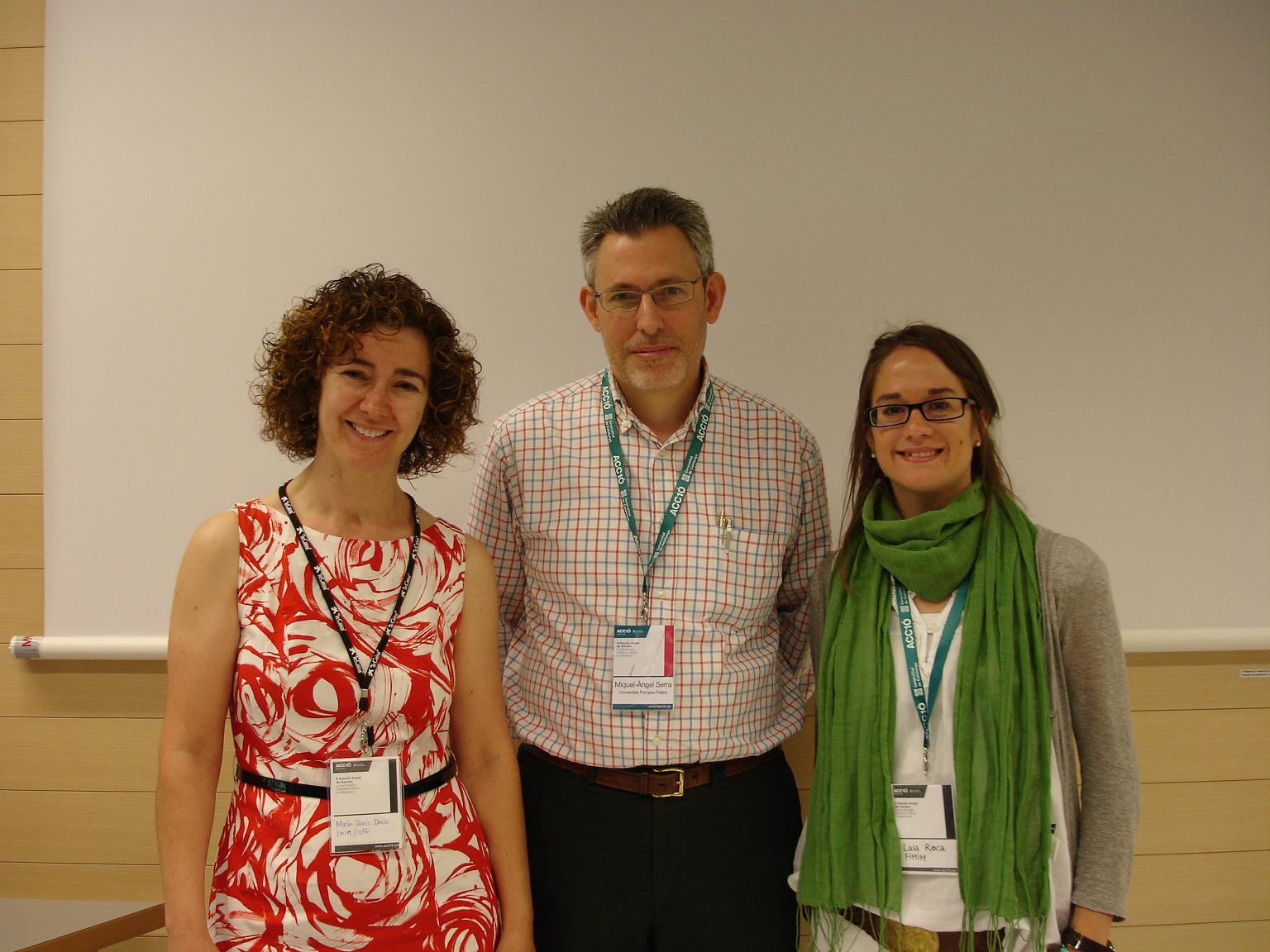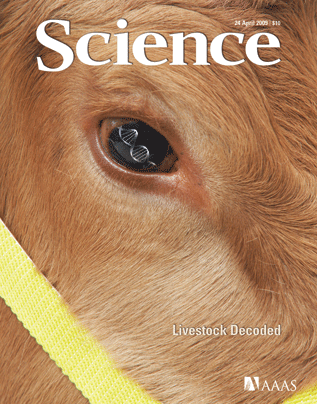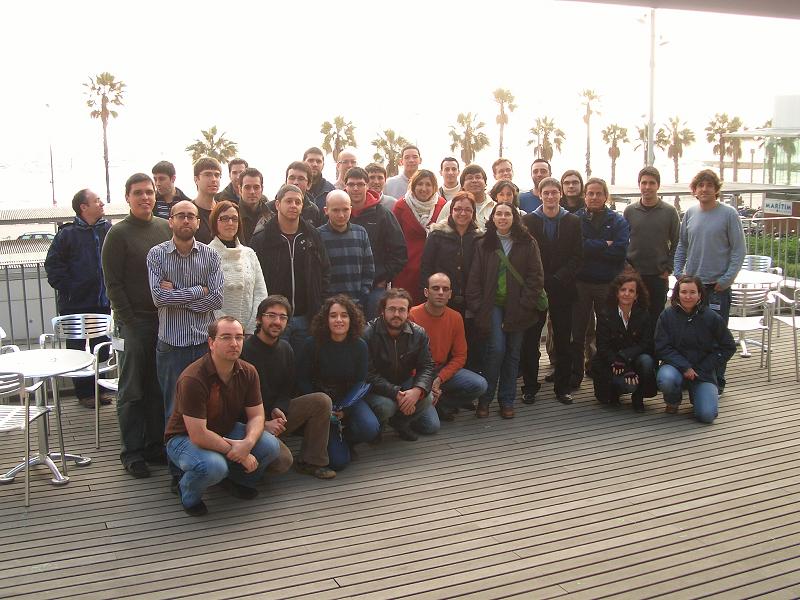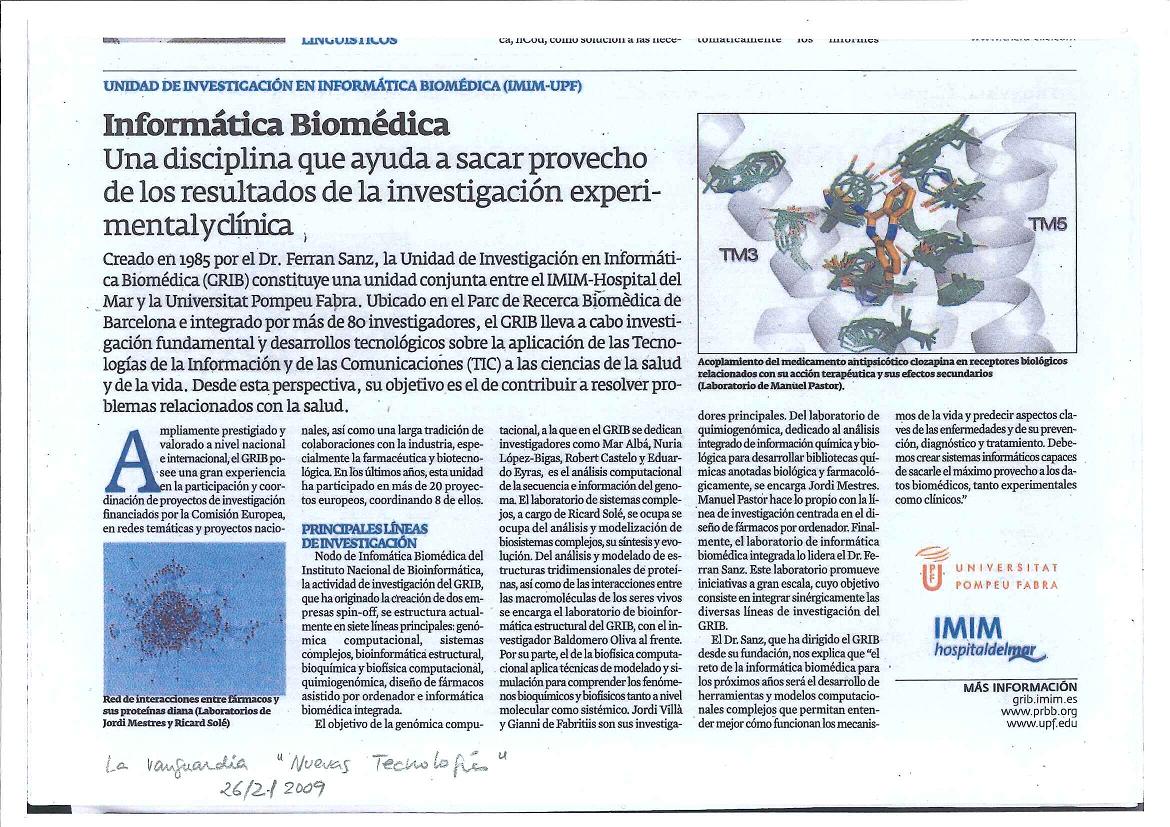
The Platform UPFARMA participates in the Xth Annual Meeting of Technology Transfer Networks organized by ACC1Ó (CIDEM)
The Platform UPFARMA has participated in the Xth Annual Meeting of Technology Transfer Networks organized by ACC1Ó (CIDEM). The event took place the last 27th of April at the Word Trade Center premises in Barcelona where the new project of ACC1Ó “The Catalonian Technological Network” (TECNIO) was presented.
30/4/2009
Fuerte papel español en la I edición de la IMI
Diario Médico, 30 de Abril de 2009
El eTOX es el único proyecto presentado a la primera convocatoria de IMI liderado por una institución española -la Fundacion IMIM -y que quedó situado en primera posición dentro de su tema en la primera fase de evaluación de propuestas.

24/4/2009
Bovine genome provides clue to mammalian evolution and to an efficient and sustanable cuttle
Researchers of the Centre for Genomic Regulation (CRG) and Universitat Pompeu Fabra (UPF) take part in the Bovine Sequencing Project. The bovine genome, consisting of at least 22.000 genes, is more similar to that humans than that of mice or rats. Roderic Guigó (CRG) & Eduardo Eyras (GRIB - UPF/ IMIM) also signed the studies of sequencing other genomes (human, mice & rat) and now they have collaborated in this new international study published in Science
14/4/2009
GRIB organizes the 2nd Course on Design and Management of Research Projects
A course on 3 (+1 optional) sessions: May 25th, 26th; 27th (and an optional presentation on June 4th) at the Barcelona Biomedical Research Park. Find more details, including a preliminary program, at http://nemo.imim.es/management
Information Day IMI (Innovative Medicines Initiative): Experiences of the first call and future prospectives
The Spanish Technological Platform for Innovative Medicines (PTMI), IMIM Foundation and Biocat invite you to this event to be held the 27th of March at Auditorio Wellington of Universitat Pompeu Fabra (C/ Ramón Trías Fargas, 25-27). It is specially adressed to pharmaceutical and biotecnological industry.

2/3/2009
Barcelona School on Biomedical Informatics
Last week the first Barcelona School on Biomedical Informatics, promoted from the Research Unit on Biomedical Informatics (GRIB) came to a close with a noteworthy success in attendance and achievement of objectives.
The school consisted of an innovative formula that combined the presence of expert speakers on the subject running plenary and tutorial sessions, followed by group work sessions where the students applied some of the things learned during the morning sessions to situations of biomedical interest.
Jordi Villà i Freixa, the organiser of this edition, explains that this was the beginning point for a new model of school, much more participatory than the traditional workshops and with a strong practical component.

26/2/2009
The Research Group on Biomedical Informatics (GRIB) appears in La Vanguardia
The supplement "Nuevas Tecnologías" of La Vanguardia, has published today an article about the Research Group on Biomedical Informatics (GRIB) of the Experimental and Health Sciences Department. Link to the supplement: http://www.guiadeprensa.com/revistas/vanguardia/enero_2009.pdf(See page 12)

30/1/2009
El GRIB participa en la II Conferencia Anual de las Plataformas Tecnológicas de Investigación Biomédica: Medicamentos Innovadores y Nanomedicina, Madrid 27 y 28 de enero de 2009
8/10/2008
GRIB organizes the Barcelona School on Biomedical Informatics (16th-20th February 2009)
The Barcelona school on biomedical informatics, is going to be held at the Parc de Recerca Biomèdica de Barcelona (PRBB) premises in February 16th to 20th 2009. It is an activity targetted at early stage researchers in the field of translational bioinformatics or biomedical informatics.
The school will include plenary conferences that are open to everyone and that will take place at the at the conference hall of the PRBB. They are the following:
Plenary Lecture 1 - Tuesday February 17 at 8:45am
“Bioinformatics Resources for Genomic Studies: the INB case”
Dr. David G. Pisano, CNIO - INB (Spain)
Plenary Lecture 2 – Wednesday February 18 at 8:45am
“Complex Chronic Disease.What's the problem?”
Dr. Francesco Falciani, University of Birmingham(UK)
Plenary Lecture 3 – Wednesday February 18 at 9:45am
“Metabolic basis of complex diseases”
Dr. Marta Cascante, Universitat de Barcelona (Spain)
Plenary Lecture 4 – Thursday February 19 at 8:45am
“Pharmacoinformatics”
Dr. Ferran Sanz, UPF (Spain)

28/10/2008
NVIDIA CUDA TECHNOLOGY DRAMATICALLY ADVANCES THE PACE OF SCIENTIFIC RESEARCH
Distributed Computing Applications use NVIDIA GPUs for Biomedical Research, Space Exploration and Searching for Extra Terrestrial Intelligence
SANTA CLARA, CA—December 17, 2008— Once thought of as a technology used only for computer games, NVIDIA® GeForce® graphics processing units (GPUs) with CUDA™ technology are now being used for the serious business of scientific computation. Berkeley's Open Infrastructure for Network Computing (BOINC), one of the leading distributed computing platforms in the world, is using CUDA technology to tap the massively parallel processing power of NVIDIA GPUs with astounding results that could change the pace of scientific discovery through projects like GPUGRID and Einstein@home. The latest breakthrough came with the release of an optimized client that will allow SETI@home to analyze SETI (Search for Extraterrestrial Intelligence) data in about one-eighth of the time it previously took using CPUs.



